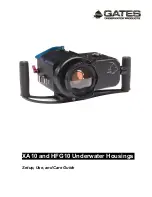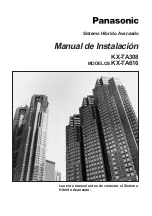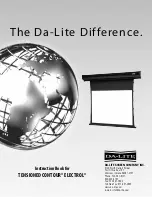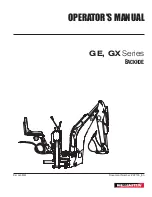
PA
G
E
13
P32/42 C
HASSIS
P32/42 Rev. 12/98
Section 13 – Heating/Cooling
To provide satisfactory engine cooling, the following conditions must be met:
D
The minimum frontal area for the Chevrolet/GMC is 360 square inches, to be
directly in front of the radiator. If the vehicle grille area is not directly in line with
the radiator face, filler panels between the radiator and grille must be used to
direct the air through the radiator. Any area outside of a 45
_
angle from the edge
of the radiator should not be considered as grille open area, for cooling.
D
The grille opening should be ‘open’ in configuration. Small holes for the grille
opening tend to restrict air flow more than large holes although both may have the
same frontal area.
D
Cooling can be improved by inserting filler panels between the outer vertical side
edges of the radiator and grille. In addition, a filler panel should be fitted
horizontally from the bottom of the radiator out to the bottom of the grille. This will
prevent air from by-passing the radiator and exiting through the front wheel house
area or under the radiator. These panels will force the air through the radiator.
D
A flexible air-tight seal must be provided between the upper radiator support and
the body to aid idle cooling and prevent hot air recirculation. The seal assures
that incoming ‘ram air’ must go through the radiator core rather than by passing
the radiator core (going up and over the core).
D
Bug screens should be avoided if at all possible. If conditions require a bug
screen, motor home owners are advised to be alert to possible engine
overheating problems as well as temperature changes. The screen’s mesh
should be-at most-half as dense as that of standard household screening.
Household screening will create an overheating condition. The bug screen
should be removed immediately upon leaving the bug infested area.
Do not install any internal flow restrictors.
The 3 way or ‘H’ valve is not required in the heater system for port fuel injected
engines.
Coolant Recovery Bottle:
1. Mount the coolant recovery bottle in an easily accessible area with the top
approximately the same height as the radiator fill cap. The bottle must be sup-
ported by the two attaching embossments at the top and also by the rib at the
bottom of the bottle to prevent failure of the unit. You may use the supplied
bracket and rework as required for proper mounting.
2. Hose may be cut to proper length as required to reach from the radiator over-
flow tube just under the radiator cap to the larger diameter nipple on the cool-
ant recovery bottle cap. Retain the hose by using two 5/8 in. hose clamps.
3. For the initial fill of the coolant recovery bottle, fill to the “hot” mark on the
bottle. This allows the system to initially purge itself and maintain the proper
coolant level. Refer to the Owner’s Manual for proper mixture.
The following statement applies to P 30042 models only.
Radiator support assembly is not a structural member. No body mounting supports or
other attachments used for structural purposes are to be fastened to radiator support
assembly. Example: Horns should not be mounted on the radiator support assembly.
The following statement applies to P 30032/42 diesel models only.
For diesel engines, a de-aeration tank is added to the cooling system. This system will
pass normal combustion gases out of the cooling system. The de-aeration cooling sys-
tem includes a de-aeration tank, radiator, fitting and hoses.
Heater
Be sure to add coolant to system after adding capacity to system (heaters).
If a heater is installed on the vehicle, a bleeder valve must be added to the heater return
line at the heater in the return line to the engine, valve must be at this point since it is the
highest point in the system. The purpose for the bleeder is to bleed air from the system
after the heater and lines are installed. Failing to do so can cause water pump seal dam-
age.
Proper bleed procedure are as follows:
1. Open bleeder valve and fill cooling system with coolant until coolant exits
valve.
2. Close valve and continue filling system until full.
3. With radiator cap off, start engine and run for approximately two minutes at
medium RPM.
4. Shut engine off, open bleeder valve and fill system as above and run again for
two minutes.
5. Shut engine off, top off coolant and install radiator cap.
6. Check for leaks at connections.
Summary of Contents for P32
Page 32: ...PAGE 32 P32 42 CHASSIS P32 42 Rev 12 98 P 30032 Auto Apply Park Brake Harness Ground...
Page 33: ...PAGE 33 P32 42 CHASSIS P32 42 Rev 12 98 P 30000 Instrument Cluster Location...
Page 35: ...PAGE 35 P32 42 CHASSIS P32 42 Rev 12 98 P 30000 Chassis Data...
Page 36: ...PAGE 36 P32 42 CHASSIS P32 42 Rev 12 98 P 30032 Taperleaf Suspension...
Page 37: ...PAGE 37 P32 42 CHASSIS P32 42 Rev 12 98 P 30042 Gas Engine 5 7L V8 Option L31...
Page 38: ...PAGE 38 P32 42 CHASSIS P32 42 Rev 12 98 P 30042 Gas Engine 4 3L V6 Option L35...
Page 39: ...PAGE 39 P32 42 CHASSIS P32 42 Rev 12 98 P 30032 Gas Engine 7 4L V8 Option L29...
Page 40: ...PAGE 40 P32 42 CHASSIS P32 42 Rev 12 98 P 30032 Diesel Engine 6 5L Turbo Ho Option L65...
Page 41: ...PAGE 41 P32 42 CHASSIS P32 42 Rev 12 98 P 30042 Diesel Engine 6 5L HO Option L57...
Page 43: ...PAGE 43 P32 42 CHASSIS P32 42 Rev 12 98 P 30042 Air Conditioning Fittings...
Page 44: ...PAGE 44 P32 42 CHASSIS P32 42 Rev 12 98 P 30042 Air Conditioning Compressor Locations...
Page 45: ...PAGE 45 P32 42 CHASSIS P32 42 Rev 12 98 P 300 32 42 Fuel Filler Neck...
Page 46: ...PAGE 46 P32 42 CHASSIS P32 42 Rev 12 98 P 30000 Fuel Tank Arrangement...
Page 47: ...PAGE 47 P32 42 CHASSIS P32 42 Rev 12 98 P 30000 Temporary Fuel Tank Arrangement...
Page 48: ...PAGE 48 P32 42 CHASSIS P32 42 Rev 12 98 P 30000 Center High Mounted Stop Lamp CHMSL...
Page 49: ...PAGE 49 P32 42 CHASSIS P32 42 Rev 12 98 P 300 32 42 Lamp Mounting P 30032 P 30042...
Page 50: ...PAGE 50 P32 42 CHASSIS P32 42 Rev 12 98 P 300 32 42 Instrument Panel Cut Out...














































